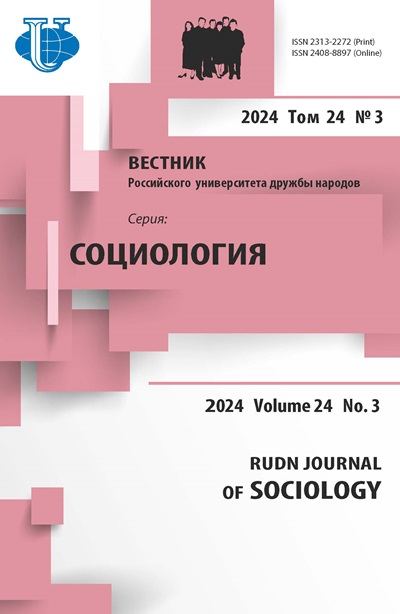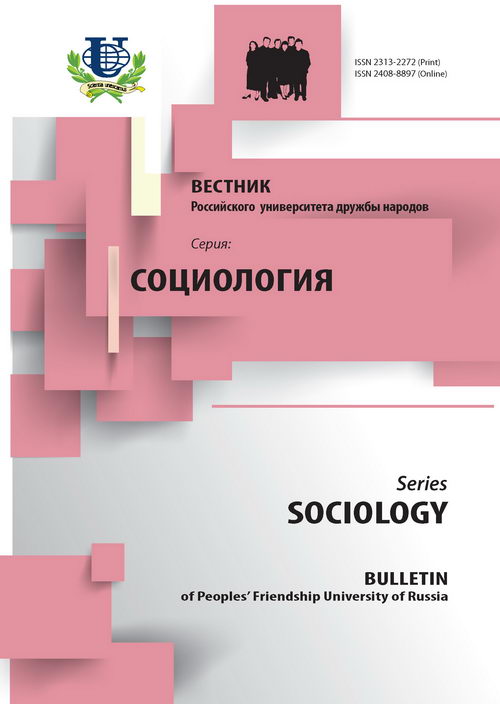No 3 (2012)
- Year: 2012
- Articles: 12
- URL: https://journals.rudn.ru/sociology/issue/view/398
Articles
The Present as the Battlefield of Anthropology
Abstract
Man is a supple creature. One's idea of self affects the person's behavior. In these terms, the anthropological ideas prevailing in culture and stemming from religion, philosophy or ideology, have a considerable impact on its form and development. This article analyzes modern history from the point of view of the birth, evolution and collision of different anthropological conceptions and ideas. This being but a brief essay, the author considers only the major evolution lines of these conceptual patterns, emphasizing the theoretical and practical significance of Kant's question: What is a human being?
 5-17
5-17


Reproduction and Measurement of the Human Capital in the World Today
Abstract
Recognition of man's supreme role in social production is an undoubted accomplishment of the human capital theoreticians. This theory became wide spread in the West and won a great number of supporters in our country due to the fact that the conception focuses on the basic factor of social-economic development - the human factor, in its new quality. The interpretation of the human capital in terms of reproduction makes it possible to identify its fundamental nature, as well as the contradictions arising in the course of the formation, functioning and development of the human capital on its different levels of objective reality: family, corporate and national levels and on the level of the world economy as a whole.
 18-29
18-29


Trolling in Social Nets: Emergence and Development
Abstract
In contemporary society the development of the Internet sees the emergence of new phenomena, such as trolling. The specific features and main characteristics of this phenomenon, together with its trends and development tendencies are today in the focus of modern social and humanitarian sciences. These issues are considered in the article in terms of sociology.
 30-37
30-37


Determinants of International (Interethnic) Conflicts in the Russian Federation Regions
Abstract
The events of the past few years in Moscow and in a number of regions of the Russian Federation are evidence of the growing tension in international (interethnic) relations. In this sphere, sociological studies can play an important role by promptly revealing the arising contradictions and problems. This article deals with the results of these studies and their importance for preventing international (interethnic) conflicts.
 38-47
38-47


The Image of Serbia in Russian Society: Results of a Survey of Moscow Students
Abstract
The article presents the results of an evaluating sociological study aimed to identify the main social stereotypes that young Russian people have concerning the Serbs and Serbia - a country that historically has long-standing friendly relations with Russia. In the past decades, Serbia has been often mentioned in the Russian press, mostly in the context of several key discourses (the Orthodox religion as a common foundation of the culture of our two countries, the unsolved ethnic and territorial conflicts, the confrontation of pro- and anti-Western views in the political sphere), which allow us to assume that Russian students have mature social ideas of Serbia, though not of high importance.
 48-59
48-59


A Sociological Approach to the Study of Household Access to Drinking Water in the Former Soviet Union Countries
Abstract
The article deals with the analysis of the data of the sociological study Health of Societies in the Times of Transition (HITT) carried out in 2010, which investigated, in particular, the changes in the population's access to piped household water in the former Soviet Union countries between 2001 and 2010, and examines how these depended on the household's economic status. The paper is based on 2 international research projects: The Living standards, Lifestyles, and Health (LLH) project of 2001 and the follow-up study carried out in 2010 - Health in the Times of Transition (HITT). This article is addressed to experts in sociology, statistics, social work and health, as well as a wide range of people interested in the changes in the social and economic situation in the former Soviet Union.
 60-69
60-69


The Effectiveness of Investing into the Innovative Human Capital: Assessment of Students in Kazan
Abstract
This article analyzes the assessment of the effectiveness of investing into the innovative human capital by the students of Kazan. The effectiveness of investing into the human capital was estimated at two levels: potential and real. The results suggest an overestimation by the respondents of the potential level of investment: the students overestimate their readiness to work in their specialty, which adversely affects the formation of their criteria for evaluating the effectiveness of investing into their own human capital.
 70-81
70-81


Innovative Behavior in Russian Business-Organizations: Theoretical and Methodological Foundations of Empirical Research
Abstract
The article presents the framework of empirical research into individual innovative behavior in Russian business-organizations. On the basis of the analysis of contemporary world literature and the results of empirical research of social aspects of business innovations the authors put forward a hypothesis that innovation-related processes are interrelated on the micro-, mezzo-, and macro-levels. On the one hand, the innovative development of business and the creation of useful innovations result from the individual activity of the employees. On the other hand, the social macromedia is the key factor, determining the innovative efficiency not only of business organizations, but of society as a whole.
 82-93
82-93


The SWOT-Analysis Sociological Measurement in Business
Abstract
The article examines the conditions for companies' successful development, combining strategic PR-planning and marketing tactics based on sociological measurements. For this purpose the author studies the environment by estimating the activities of the competitors, suppliers and consumers, and analyzes the current position and opportunities of the enterprise itself, with its technical, technological, financial, raw material and other resources. The author shows the mechanism of applying the SWOT-analysis as a matrix of primary strategic analysis. This method allows to carry out an integrated research of various aspects of the external and internal environment and to choose an optimal marketing strategy.
 94-103
94-103


 104-110
104-110


Congratulations
 111-111
111-111


Authors
 112-113
112-113

















